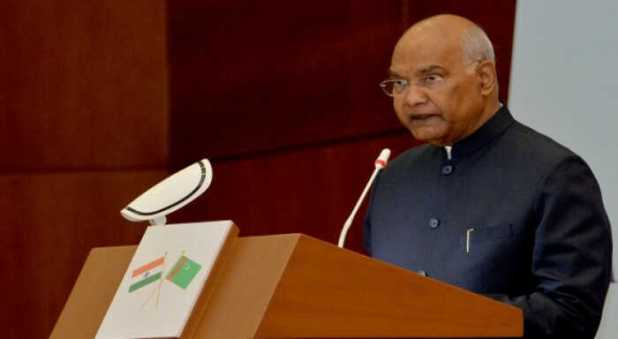
Ashgabat/New Delhi, April 3 : President Ram Nath Kovind said that one of the focus areas of Indian foreign policy in the last few years has been the revitalization of its historical ties with the Central Asian countries, which are a part of its ‘extended neighbourhood’. In an address at the Institute of International Relations, Ashgabat, the President also said he was pleased to note that 30 Turkmen diplomats have so far undergone Professional Courses at the Sushma Swaraj Institute of Foreign Service in New Delhi. He said India and Central Asia, as developing countries, share common perspectives and similar approaches. The two face common challenges such as terrorism, extremism, radicalization, drug trafficking etc. India has also strategic relations with most of the Central Asian countries, he said and referred to the ‘India-Central Asia Summit’ in January this year which was held to take the partnership to newer heights. “The institutionalization of this Summit mechanism has added a new chapter in our partnership,” he added. He said connectivity with the Central Asian countries remains a key priority for India. India is a member of both the International North-South Transport Corridor, and the Ashgabat agreement. “We have taken steps to operationalize the Chabahar port in Iran which can provide a secure, viable and unhindered access to the sea for the Central Asian countries.” “While expanding connectivity, it is important to ensure that connectivity initiatives are consultative, transparent and participatory, with respect for the sovereignty and territorial integrity of all countries,” he said, in an apparent reference to China and its Belt and Road Initiative. “India stands ready to cooperate, invest and build connectivity in the region.” On Afghanistan, he said “We share a broad ‘regional consensus’ on the issues related to Afghanistan, which includes the formation of a truly representative and inclusive government, combating terrorism and drug trafficking, central role of the UN, providing immediate humanitarian assistance for the people of Afghanistan and preserving the rights of women, children and other national ethnic groups and minorities in Afghanistan.” On Ukraine, he cited India’s position which he said has been steadfast and consistent. “We have called for immediate cessation of violence and hostilities and return to the path of dialogue and diplomacy. We have also provided humanitarian assistance to Ukraine.” “India and Turkmenistan are ancient civilizations but young nations. Last year, your country celebrated the 30th anniversary of independence while the people of India are celebrating 75 years of our independence this year. The renowned Turkmen poet Magtymguly Pyragy said, “If God gets wings, he will fly to India.” India is the birthplace of at least four major religions, Hinduism, Jainism, Buddhism and Sikhism. Over 200 million Muslims proudly call India their home. India’s receptiveness to other cultures has been its hallmark while ty in diversity remains its inherent strength,” he said. The President voiced delight about the appreciation of Indian culture in Turkmenistan, especially Indian films, TV serials, music and dance. “I am told that Indian actors and actresses from several generations are household names here. It is heartening to learn that Indian dance and songs are performed at important events. Following the establishment of Central Asia’s first Yoga and Traditional Medicine Centre in Ashgabat in July 2015, Yoga and Ayurveda have also captured the imagination of the people here. All these are shining examples of the rich cultural linkages between our two countries.” He later inaugurated an ‘India Corner’ at the Institute of International Relations. The ‘India Corner’ is envisioned to create interest in India amongst the students of the Institute in organizing India related activities. The Government of India has provided computers, books on India and musical instruments and other materials to equip the ‘India Corner’. RN

